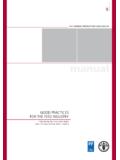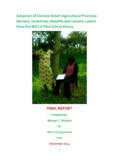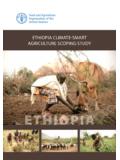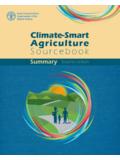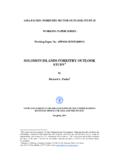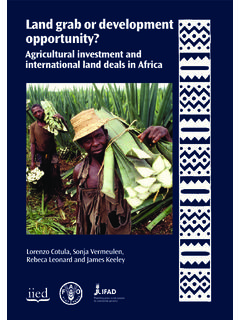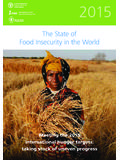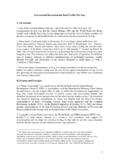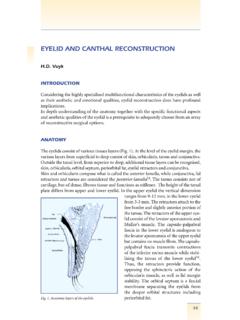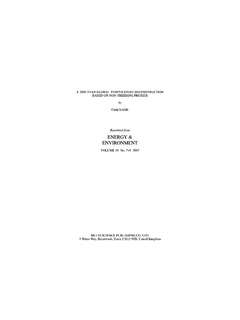Transcription of Designing warehouse receipt legislation
1 162 Designing warehousereceipt legislationRegulatory options and recent trendsFOOD AND AGRICULTURE ORGANIZATION OF THE UNITED NATIONSRome, 2015 Designing warehouse receipt legislationRegulatory options and recent trendsPhiline WehlingLegal Expert, Development Law Service, FAO Legal OfficeBill GarthwaiteLegal Consultant, Development Law Service, FAO Legal OfficeDIRECTIONS IN INVESTMENT prepared in collaboration with the Development Law Service of the FAO Legal OfficeThe designations employed and the presentation of material in this informationproduct do not imply the expression of any opinion whatsoever on the part of theFood and Agriculture Organization of the United Nations (FAO) concerning the legalor development status of any country, territory, city or area or of its authorities, orconcerning the delimitation of its frontiers or boundaries.
2 The mention of specificcompanies or products of manufacturers, whether or not these have been patented,does not imply that these have been endorsed or recommended by FAO in preferenceto others of a similar nature that are not views expressed in this information product are those of the author(s) and do notnecessarily reflect the views or policies of FAO. FAO, 2015 FAO encourages the use, reproduction and dissemination of material in this informationproduct. Except where otherwise indicated, material may be copied, downloaded andprinted for private study, research and teaching purposes, or for use in non-commercialproducts or services, provided that appropriate acknowledgement of FAO as the sourceand copyright holder is given and that FAO s endorsement of users views, products orservices is not implied in any requests for translation and adaptation rights, and for resale and other commercialuse rights should be made via or addressed information products are available on the FAO website ( )and can be purchased through further information please contact:DirectorInvestment Centre DivisionFAOV iale delle Terme di Caracalla, 00153 Rome, Italyor by e-mail to.
3 OF CONTENTSA cronyms and abbreviations vForeword viAcknowledgements viiiExecutive summary ixPART I Background and concept 1 Basic concept of warehouse receipt financing 12 Benefits of a warehouse receipt system 23 Importance of warehouse receipt legislation 34 Core elements of warehouse receipt legislation 4 References 5 PART II Reviewing and Designing warehouse receipt legislation 1 Introduction 72 Preliminary considerations 7 Defining national policy objectives 8 Legislative assessment 103 Forms of warehouse receipt legislation 11 One specific law for the warehouse receipt system 11 Separate laws for warehouses and warehouse receipts 12 Regulation of warehouse receipt system in general legislation 134 Core elements of warehouse receipt legislation 13 Scope and definitions 13 Administration 16 Licensing and oversight of warehouses 20 Performance guarantees for warehouses 27 Contractual rights and obligations of the parties 33 warehouse receipts.
4 Legal status, content, form and registration 35 Negotiation and transfer of warehouse receipts 44 Settlement and release of stored goods 45 Execution and priority of obligations 46 Offences and penalties 485 Conclusions 51 legislation consulted and references 52 PART III Country case studies 56 Argentina 56 Brazil 63 France 73ivIndia 79 Indonesia
5 90 Kazakhstan 97 The Philippines 105 Tanzania 116 Turkey 126 Uganda 134 Ukraine 142 The United States of America 152vACRONYMS AND ABBREVIATIONSACPC Agricultural Credit Policy Council (The Philippines)ACTESA Alliance for Commodity Trade in Eastern and Southern AfricaAMSDP Agricultural Marketing Systems Development Programme (Tanzania)CALF Comprehensive Agricultural Loan Fund (The Philippines)CDA Agricultural Certificate of Deposit (Brazil)CFC Common Fund for CommoditiesCOMESA Common Market for Eastern and Southern AfricaCONAB National Supply Company (Brazil)CPR Cedula de Produto Rural (Brazil)DACO Deputy Administrator for Commodity Operations (United States)DTI Department of Trade and Industry (The Philippines)EBRD European Bank for Reconstruction and DevelopmentECA Eastern Europe and Central AsiaECX Ethiopia Commodity ExchangeFAO Food and Agriculture Organization of the United NationsFCS Farm Credit System (United States)
6 FSA Farm Service Agency (United States)GDP Gross domestic productGSE Government-sponsored enterprise (United States)GUL Geneva Uniform Law on Bills of Exchange and Promissory NotesIFC International Finance Corporation (Indonesia)IFAD International Fund for Agricultural DevelopmentIMF International Monetary FundINMETRO National Institute of Metrology, Quality and Technology (Brazil)MAPA Ministry of Agriculture, Livestock and Food Supply (Brazil)MKK Electronic Registry Agency (Ukraine)NEDA National Economic and Development Authority (The Philippines)NFA National Food Authority (The Philippines)NGO Non-governmental organizationOECD Organization for Economic Co-operation and DevelopmentPHP Philippine pesoSACCO Savings and Credit Cooperative Society (Tanzania)SNCR National System for Rural Credit (Brazil)SRA Sugar Regulatory Administration (The Philippines)UETA Uniform Electronic Transactions ActUCC Uniform Commercial CodeUCE Uganda Commodity ExchangeUNCITRAL United Nations Commission on International Trade LawUNCTAD United Nations Conference on Trade and DevelopmentUNIDO United Nations Industrial Development OrganizationUSAID United States Agency for International DevelopmentUSC United States CodeUSDA United States Department of AgricultureUSWA United States warehouse ActWA Agricultural Warrant (Brazil)
7 WDRA Warehousing Development and Regulatory Authority (India)WFP United Nations World Food ProgrammeZAMACE Zambia Agricultural Commodities ExchangeviFOREWORDW arehouse receipt systems allow agricultural producers to access credit by borrowing against receipts issued for goods stored in independently controlled warehouses. These systems enable producers to delay the sale of their products until after harvest, to a moment when prices are generally more favourable. warehouse receipt systems can therefore mobilize credit for the agricultural sector and improve agricultural receipt systems bring other benefits to the agricultural sector. For example, the provision of good handling and storage by warehouses licenced and controlled according to mandatory standards can help reduce postharvest losses and improve product quality.
8 The increased storage of agricultural commodities after the harvest season may in turn contribute to stabilizing commodity price volatility. With respect to the management of national food security and strategic reserves, an effective warehouse system provides government authorities with timely and accurate information about the aggregate stock of stored agricultural commodities in the warehouse receipt systems for agricultural commodities are used worldwide, their benefits and use depend on the design of the system and prevailing local experience shows that benefits are maximized when the receipt system is based on a well-designed and enabling legal framework that ensures integrity and transparency. legislation is important to provide clarity and predictability to the rules governing the warehouse receipt system and to the rights and obligations of participants.
9 However, it is often found in practice that the necessary legislation is not in place or does not accommodate the specific needs of the recent years, many countries around the world have begun to introduce or reform legislation of their warehouse receipt system. Various objectives motivated the reforms, from mobilizing credit for the agricultural sector after market liberalization to adapting an existing system to the requirements of electronic commerce, or enhancing the income of smallholder warehouse receipt legislationviiThe Food and Agriculture Organization (FAO), together with the European Bank for Reconstruction and Development (EBRD), has provided assistance to countries undertaking such legislative reforms. In delivering this assistance, it became apparent that a comprehensive guidance for the design of legislation governing warehouse receipt systems was missing.
10 This publication is aimed at filling this gap and provides countries with guidance and evidence-based examples on how to develop enabling legislation . Based on a review of legislation worldwide, this study identifies different regulatory approaches and good practices for the design of warehouse receipt Kuemlangan, Chief, Development Law Service, Legal and Ethics Office, FAOG ustavo Merino, Director, Investment Centre Division, FAOviiiACKNOWLEDGEMENTSThe authors would like to thank the following colleagues for their valuable comments on the publication: Blaise Kuemlangan (Chief, Development Law Service, FAO), Carmen Bullon (Legal Officer, Development Law Service, FAO), Emmanuel Hidier (Senior Economist, Investment Centre Division, FAO), Michael Marx (Senior Credit and Rural Finance Officer, Investment Centre Division, FAO), Fr d rique Dahan (Lead Counsel and Head of the Financial Law Unit, EBRD), Luca Castellani (Legal Officer, UNCITRAL), Prof.

